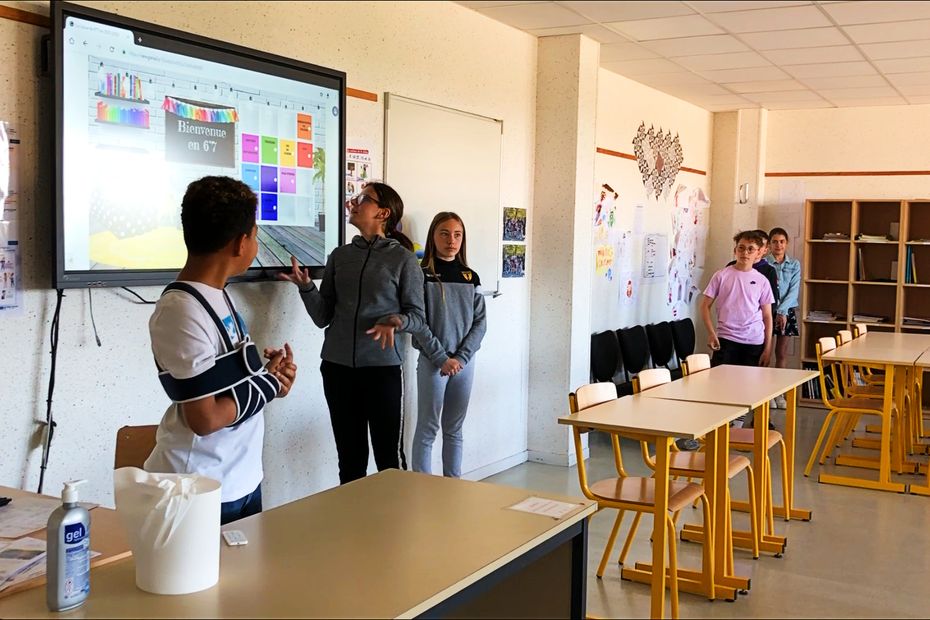The Croix des Sarrasins college, in Côte-d’Or, launched an experiment last September: a sixth-grade class in which students work independently, supervised by teachers. A new proven method.
“They all help each other, there is no judgment, no competition. There is also mutual trust from the teachers.”
Francis Bignoli
college principal
–
It’s not a Montessori class, but the idea is close. At the Croix des Saracens college, 24 students have been experimenting since the start of the school year in September with the independent 6th grade class, a first in the department (the Clos de Pouilly college also practices it, but for the 5th, 4th and 3rd).
On the day of our visit, a whole procession marched past the students. Journalists, heads of establishments, inspector, and the rector of the Dijon academy, Pierre N’Gahane. But the teenagers do not disassemble: one by one, they each present in turn an aspect of the autonomous class. They prepared themselves before our arrival, but their ease is obvious: they do not recite their text by heart, know what they are saying, answer all questions without hesitation.
It’s a miracle for some of these students
Caroline Meyer
history and geography teacher
–
“At the beginning of the year, some didn’t speak at all, they were very shy. They are transformed.“Caroline Meyer is one of the two teachers to have launched this experiment, with her colleague French teacher Sophie Abric. “I was familiar with the concept of an autonomous class because my children are educated in a primary school in the area which already practices autonomy. I decided to propose the same thing, but at the entrance to college, in sixth grade“, explains Caroline Meyer.
–
Autonomy in the classroom, what is it? “The basic concept is that we let the students“, continues Caroline Meyer. The children have educational resources available (large folders stored in binders, in particular) and can freely use them to study the chapter or theme of their choice. However, with an evaluation at the end: they must return their knowledge to their teacher, and if they have learned the course well, they get a “belt”, a sign that the learning has been validated.
–
At the end of each term, instead of class councils (where the teachers meet to draw up each student’s report card), the autonomous 6th graders go to a “success council”: “it lasts a quarter of an hour per person, we talk to the teachers, the parents are there too“, explains Louise, one of the students.
–
To study, young people have the choice: classic table or high table type “standing table”. If one is in difficulty on a teaching, the others help him. The students communicate a lot with each other, and learn to resolve conflicts. “There are relationship problems like in any class, but they last much less time“, asserts Caroline Meyer. “The children solve their problems during the “community councils”, always under the direction of a teacher, but they solve them among themselves.“
–
They all help each other, there is no judgment, no competition. There is also mutual trust among teachers.
Francis Bignoli
Principal of the College of the Cross of the Saracens
–
What motivated the launch of the autonomous class? “We started from an observation“, says the principal: “The overall lack of autonomy of students in the classroom. We also saw that the covid had had a strong impact on the students and we said to ourselves that we had to find something else.“Caroline Meyer and Sophie Abric volunteered and motivated other teachers. Today, there are about ten of them, in all subjects, to be involved in the independent class.
This observation of the lack of autonomy of students in college is not specific to Auxonne: it concerns the whole territory, according to Denis Mellier, academic inspector. “Since last year, we have been evaluating the colleges and high schools of the Dijon academy, with the objective of having them all completed within five years. We first receive self-assessments from the establishments, then we come, and we make recommendations.”
“The observation is that we develop passivity in the students. Most often, it is the teacher who gives his lesson and the students only listen. They participate very little actively, in the end.”
Denis Mellier, academic inspector
–
But the idea of the autonomous class has not yet fully entered into the mores of the teaching body. “Here, mentalities have evolved“, believes Caroline Meyer. “At first, we faced a big outcry from some colleagues.“A mistrust due to several factors.
“What scares teachers is letting go. As everyone talks a lot in independent classes, there is the fear of being taken for a teacher who is overtaken, overwhelmed by his students. There is also the fear of not progressing by following the program and therefore of not being able to complete it at the end of the year. In fact, you have to get out of your comfort zone.”
Denis Mellier
academic inspector
–
And as it always takes a little time to change opinions, the college of the Cross of Saracens will repeat the experiment next year, but only with another class of sixth. The principal, Francis Bignoli, wants “do things gradually“. For the next school year, the thirty or so future 6th graders will be selected on file, with a letter from the student, parents and teachers.
–
The students of the current 6th autonomous will go to 5th “normal”. That’s what they all want. “It’s good to alternate between the two“, judge Leandro, “that way we can show our autonomy to others”. “Autonomy allows us to prepare for a 5th normal“, confirms Louise.
“This experiment gives extraordinary results“, enthuses rector Pierre N’Gahane, who has come to see the good results of the method. He would like to extend it to other establishments.”We now have to appropriate the concept, in order to see how we can duplicate it at the level of the entire Dijon academy.“
–
–






/data/photo/2022/05/12/627c5b50c536e.jpg)
